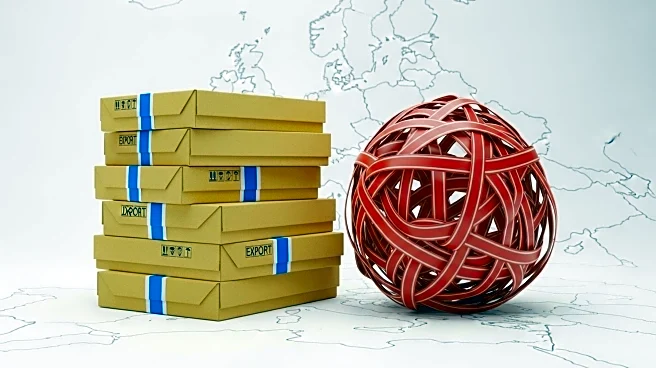What's Happening?
UK retailers are increasingly hesitant to expand into EU markets due to concerns over the complexity and cost of handling returns, according to Customs Support Group (CSG), Europe's largest customs broker. This reluctance is contributing to a significant decline in exports to the EU, with UK footwear and clothing exports dropping from £7.4 billion in 2019 to £2.7 billion in 2023, a decrease of over 60%. The issue stems from the potential for double duty payments when goods are returned or remain unsold. Nicola Haynes, a senior customs consultant at CSG, highlights that goods crossing borders are subject to tax, even if returned, unless they can be proven as previously exported UK goods. CSG suggests solutions such as individual product tracking, automating returns through customs software, and using Returned Goods Relief (RGR) to manage returns without incurring additional duties.
Why It's Important?
The hesitation of UK retailers to engage in EU trade due to returns management issues has broader implications for international business growth and profitability. The decline in exports signifies lost revenue opportunities and highlights the importance of efficient returns management in cross-border trade. By avoiding EU markets, UK retailers miss out on potential expansion and competitive advantages in the international arena. The ability to manage returns effectively is crucial not only for customer satisfaction but also for unlocking new markets without incurring unnecessary costs. This situation underscores the need for retailers to adopt strategic solutions to navigate customs processes and optimize their international trade operations.
What's Next?
Retailers may need to reassess their approach to international trade, particularly with the EU, by implementing robust tracking systems and leveraging customs software to streamline returns processes. The adoption of Returned Goods Relief (RGR) could become more widespread as businesses seek to mitigate additional tax burdens. As retailers become more aware of the potential solutions, there may be increased efforts to educate and equip businesses with the necessary tools to manage returns efficiently. This could lead to renewed interest in EU expansion, provided the complexities of returns are addressed effectively.
Beyond the Headlines
The challenges faced by UK retailers in managing returns highlight broader issues in international trade, such as the need for harmonized customs regulations and improved cross-border logistics. The situation also raises questions about the impact of Brexit on UK-EU trade relations and the long-term strategies retailers must adopt to remain competitive globally. Ethical considerations around sustainable practices in returns management may also emerge, as businesses seek to balance profitability with environmental responsibility.












